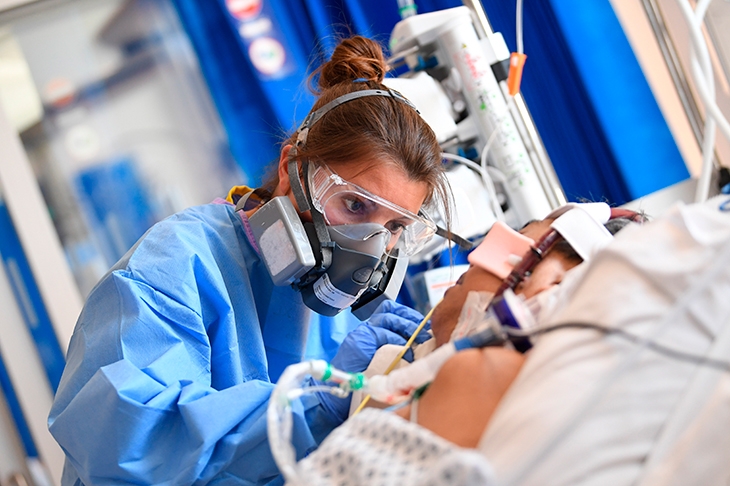This is a very British story. Because we Brits are often warlike but never militaristic, we often make a balls-up of the first phase of any campaign. The Peninsular War, the Crimean War, the Zulu War in 1879, the Boer War, the second world war; defeats and humiliations sap national morale, until we pick ourselves up, dust ourselves down, and fight back all the way to victory. This process is often abetted by improvisation and eccentricity. That has been true of the battle against Covid.
I once heard Peter Carrington say that he had been at school before science was invented. Although a generation younger, I know what he meant. In my ignorance, I made one assumption: that science was an exact science. As with the chemistry sets of my small-boyhood, if you followed the instructions, you could predict the outcome. So when the virus afflicted us, and the politicians were mocked for saying ‘follow the science’, this seemed unfair. What else were non-scientists supposed to do? It then became clear that there was no one science. Oxford said one thing, Imperial another. How was a layman supposed to decide between them? There were two further problems. First, a panic-stricken misreading of events in Italy. Second, the Tory party’s chronic failure to avoid a cloth-eared use of language. If the Italian crisis had broken out in Naples or Palermo, no one would have worried. But Bergamo: that is a city which combines German efficiency with Italian flair. If people were dying on trolleys in its hospital corridors, what would happen when the plague reached Birmingham? Here, the right words could have helped to calm everyone down. From the outset, there was only one solution to Covid: herd immunity. Yet that was a disastrous phrase. It made human beings sound like cattle. So why not call it ‘collective immunity’?
There is one other way of providing reassurance: an accurate test which will tell us who has the disease. We may now have one. There is a remarkable fellow called Craig Rochford. He started out as an engineer and has a doctorate in fluid mechanics (whatever that is). He designed the EpiPen mechanism. While retaining a relentless scientific curiosity, he became an entrepreneur and an educationalist. In one of the Tottering-by-Gently cartoons in Country Life, Lord Tottering and one of his muckers are observing a group of gyrating female teenagers. One says to the other: ‘D’you think it’s possible that the number of daughters a chap has is directly proportionate to his wickedness in a previous life?’ Although Craig has six daughters, he would not agree. Rewarding academic success with kittens, he insisted that they all did Latin and physics to GCSE. The girls are all delightful and able. At least one of them is on her way to becoming a world-class scientist. Craig has done more to promote female education than anyone since John Stuart Mill. Last year, he raised money for a cancer research outfit. While doing so, he thought hard about the problems of testing and diagnosis — so he was already mentally geared up when Covid struck. He concluded that an effective way to test for the disease had to be saliva-based. While the government was still fiffing, faffing and fiddling about with swabs, he got to work. There was a time when the bar of the Travellers Club would often be a discreet recruiting-station for SIS. Craig was looking for other skills. He found them in a youngster called Billy Brantingham, a biochemist with a first from Oxford. Billy recruited engineers, biochemists and computer scientists, all in their early twenties, all inspiringly promising, mainly from Oxford but including the odd Cantab to add class. There is an aesthetic pleasure in listening to powerful minds at full throttle, even if one only understands one sentence in three. These kids appear to have cracked the problem of testing. Their company, Halo, has won the support of Sir Walter Bodmer and Karol Sikora, two of the most distinguished medics of our time. It is now launching itself on the world. Although a test is not the same as a vaccine, it should make it easier to return to normal life, and to persuade the public that stoicism is preferable to panic.
This could also make it easier for the government to focus on economic problems, though there is an obvious difficulty. If it is hard to follow the science, what hope is there of guidance from the dismal science? A Keynesian stimulus seems desirable to repair the virus-borne damage. If that is absorbed by jobs and output, well and good. But if it stokes prices and wages, we end up with stagflation: social, political and economic chaos. So how can we tell the difference between stimulus and strychnine? One assumes that we can trust Rishi Sunak’s judgment, but what about Boris? That brings us to the most important question in current British politics. Has he lost his intellectual self-confidence?






Comments